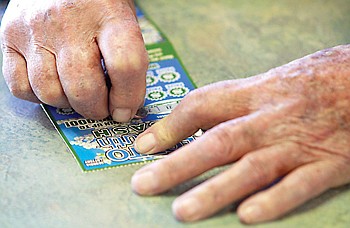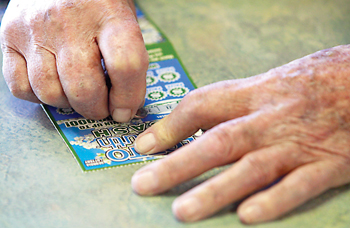Both Tennessee's and Georgia's lottery-funded HOPE scholarship programs are struggling to make ends meet as lottery ticket sales slow and education expenses steadily increase.
The education programs pay for college tuition, prekindergarten and technical college tuition. Tennessee's program also covers after-school programs.
Those programs have grown so popular, and so many students are qualifying -- more than half a million are expected to benefit this year -- that Georgia has had to pull heavily from lottery reserves since 2009 to meet all its HOPE obligations. Tennessee has seen similar troubles in recent years.
"We've got all these potentially growing demands, but there are only so many HOPE dollars that are going to be there," Rep. John Meadows, R-Calhoun, speaking at a recent roundtable with Chattanooga Times Free Press reporters and editors. "It's either going to be spread thinner or you've got to restrict it."
In 2011, Georgia's HOPE Scholarship is projected to have a $270 million shortfall if changes aren't made, and the deficit could grow even larger in future years. Estimates show the state depleting its HOPE reserves by 2012.
The situation is so dire, legislators may be forced to cap college and university scholarships, the signature portion of the HOPE program, for the first time since the lottery's began funding scholarships in 1994.
"You've got to restrict the grant somehow," said Sen. Charlie Bethel, R-Dalton. "That is going to be part of this year's budget process. You've got to do all you can to preserve HOPE."
HOPE now covers tuition at any public college or university, no matter the amount. But the financial pressure may force officials to rethink that, said state Sen. Jack Hill, R-Reidsville, chairman of the Senate Appropriations Committee.
"Lacking some high-level change like adding sales tax to lottery tickets, there is no way to make the numbers work and keep unlimited tuition," Hill said. "Basically, we're going to have to cap HOPE and make these numbers work with as little wear and tear as possible."
Earlier this month, in his first State of the State address, Gov. Nathan Deal warned that the HOPE scholarship and pre-K program could deplete the lottery's $521 million cash reserves by 2012 if legislators don't find more revenue or make benefits harder to obtain.
"HOPE is now on an unsustainable course," Deal said.
Tennessee HOPE
Tennessee's lottery, while it has dipped into its reserves previously, now appears to be on more solid footing, said state Sen. Andy Berke, D-Chattanooga, who sits on the Lottery Stabilization Task Force.
"There were rumors and worries that we were going to eat into our surplus and that we may soon begin running humongous deficits," Berke said.
Tennessee's lottery ticket sales appeared to grow in the second quarter this fiscal year, which ran from Oct. 1 to Dec. 31. In that quarter, the lottery sent $72 million to the state for education programs, up by $5.8 million over the previous quarter, according to numbers supplied by the Tennessee Education Lottery.
Citing the improved sales numbers, Berke said the HOPE programs may not need much adjustment in this legislative session.
"We need to monitor the situation to ensure that we keep the promises we've made to the students," Berke said. "We also should be hesitant to make wholesale radical changes that aren't necessary."
Unlike Georgia, Tennessee caps tuition at $4,000 per year for each student enrolled at a public or private university. Tennessee started its lottery-funded scholarship program in 2003 and South Carolina began its lottery in 2002, roughly the same time Georgia's lottery began to plateau, records show.
In Georgia, it's easier to hold onto scholarship benefits if grades slide once in college. Both Tennessee and Georgia require a 3.0 grade- point average, but Tennessee students who fail to maintain a 3.0 GPA can only have benefits restored once. In Georgia, benefits can be reinstated up to three times.
"We've got all these potentially growing demands, but there are only so many HOPE dollars that are going to be there," Meadows said.
HOW THEY RANKGeorgia and Tennessee in 2009 ranked toward the bottom third of states with lotteries in terms of proportion of lottery earnings spent on education.State Total earnings Prize spending Education Percent on education1. West Virginia $799 million $119 million $647 million 81%2. South Dakota $148 million $23 million $118 million 80%30. Georgia $3.2 billion $2.1 billion $861 million 27%36. Tennessee $1 billion $705 million $260 million 26%41. Minnesota $429 million $310 million $94 million 22%42. Massachusetts $4 billion $3 billion $844 million 20%Note: Only 42 states had lotteries in 2009, the latest year data was available.Source: U.S. Census Bureau, State Government Finances
In Georgia in 2010, nearly 89,000 students used the HOPE Scholarship at public colleges. Another 14,000 students used the grant at private schools, according to the Georgia Student Finance Commission. And 188,000 students used the grant at technical colleges.
The Peach State's much-older lottery program has seen ticket revenues plateau, then slip in recent years.
Georgia's lottery revenues fell by $17.7 million in the second quarter of this fiscal year compared to the same quarter of fiscal year 2010. The state lottery transferred $205 million to education programs in the first quarter of 2011.
In all, some 580,000 individuals are expected to benefit from a HOPE program in 2011. That's nearly double the number of beneficiaries compared to 2000. Much of the growth has taken place at technical colleges, havens for the unemployed who want new jobs skills to compete in the workforce. But Georgia puts no cap on how much technical college students can receive over a life time and there is no GPA requirement to receive or keep the scholarship.
Lottery earnings were $867 million from October to December 2010, records show, which translates to about $9 million less than the previous quarter for education programs.
The state had to pull $150 million from lottery reserves to meet last year's HOPE obligations, which totaled $1 billion. If there are no changes to the scholarship program, the program will need to pull $243 million from reserves this fiscal year.
By 2012, HOPE's expenses will reach $1.2 billion and reserves will be depleted, according to Georgia Student Finance Commission projections.
Deal's budget, which is being debated now and will affect students enrolling in college in fall 2011, calls for all HOPE programs to spend no more than $831 million, Hill said. The college tuition program alone will endure $171 million in cuts, Hill said. That number may change as budget negotiations move forward, but he's sure the program will face deep cuts.
Georgia has never had a HOPE cap for public colleges and universities, Hill said. In spring semester this year, tuition at the University of Georgia -- minus fees, which aren't fully covered by HOPE -- is $3,780 for a full-time student. HOPE caps private school tuition at $2,000 per semester.
"If you look at all the possible cuts [to HOPE] and you take out the two or three big ones that probably won't happen, you're left with pretty small stuff," Hill said. "There probably won't be completely free tuition."
Hill said there isn't much legislative will at the moment to send a larger cut of lottery earnings to the state or to tax lottery tickets, so options are limited to limiting how much scholarship money students receive.
Bethel said Georgia has some of the largest lottery-game payouts in the nation, and Hill proposes that, if the lottery simply sent an additional 1 percent of its earnings, that could ease the proposed restrictions. Currently, nearly 30 percent of all lottery earnings are used for education.
"Nobody in the country charges sales tax on lottery right now," Hill said. "And right now, with the new governor, everyone is just feeling their way around. Nobody has been studying it long enough to take drastic action."

